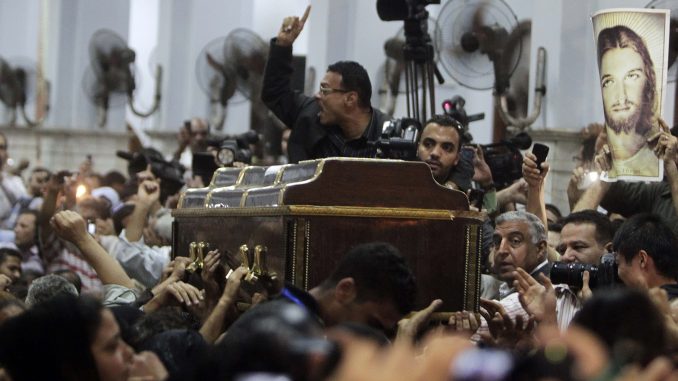

From two troubled Middle Eastern countries come these stories of Christians under attack.
First, over the weekend three people were killed and 18 more were injured in an attack on a Coptic Christian church during a wedding:
An eight-year-old girl was among those killed at the Church of the Virgin in Cairo’s working class neighbourhood of Al-Warrak, while 18 others were wounded in the late Sunday attack, officials said.
“There were two men on a motorbike and one of them opened fire,” as a crowd emerged from a wedding service, the interior ministry said. Khaled al-Khatib, a senior official from the health ministry, confirmed the casualties, though it was not immediately clear if all three were Coptic Christians.
Prime Minister Hazem Beblawi condemned the attack in a cabinet statement, calling it a “despicable criminal act,” and said security forces were searching for the assailants.
“Such terrible acts will not succeed in dividing Muslims and Christians,” he said.
Egyptian Christians, the majority of whom are Copts, have been targeted since Morsi was swept out of power by the army amid mass protests against his year-long rule, and in particular since an August 14 crackdown by security forces on two Cairo camps of Morsi supporters.
Islamists were enraged by the deadly crackdown and accused Coptic Christians of backing the coup that toppled Morsi, who hails from the Muslim Brotherhood and was Egypt’s first democratically elected president.
While no one has claimed responsibility for the attack, Asia News reports, “A few minutes before the shooting, some Islamist leaders, jailed a few months ago for incitement to violence, posted messages on Twitter threating such attacks.”
Meanwhile, in civil war-torn Syria, bombs were found last week in one of the world’s oldest churches, according to the country’s most senior churchman:
On a visit to London to highlight the persecution of Christians in the civil war, Patriarch Gregorios III said the two devices were found at the Cathedral of Constantine and Helen in the rebel-held town of Yabroud.
Not only is the church one of the oldest in the world, but it lies in a town where Christians and Sunni Muslims have so far resisted efforts by al-Qaeda-affiliated rebel groups to drive a wedge between them. …
The Patriarch said that early on Tuesday morning, two remote controlled bombs were discovered planted in the church, one of them in the confessional box. Challenging the town’s image of harmony, he also claimed that local Christian families had been asked to pay a monthly protection tax of $35,000 by local “armed groups”.
“Yabroud is under the control of armed groups, and Christians are asked for protection money, yet in spite of this, there are these bombs being placed in the church,” he said.
He added that in the event of a rebel victory in the country’s civil war, life for Christians could get even harder because of the hardline Islamist elements in the anti-government ranks.
“The extremists are against even the normal rebel opposition,” he said.
“This is an issue for Muslims as well as Christians. I am not afraid from Islam, I am just afraid of chaos, which will allow these groups to play a very destructive role.”
The patriarch was speaking as part of event organised by Aid to the Church in Need, a Catholic charity that supports Christians facing persecution around the world. In a new report, it has highlighted particular concerns about the Christian minority in Syria, who are at risk from al-Qaeda factions in the rebel movement fighting President Bashar al-Assad.
If you value the news and views Catholic World Report provides, please consider donating to support our efforts. Your contribution will help us continue to make CWR available to all readers worldwide for free, without a subscription. Thank you for your generosity!
Click here for more information on donating to CWR. Click here to sign up for our newsletter.


